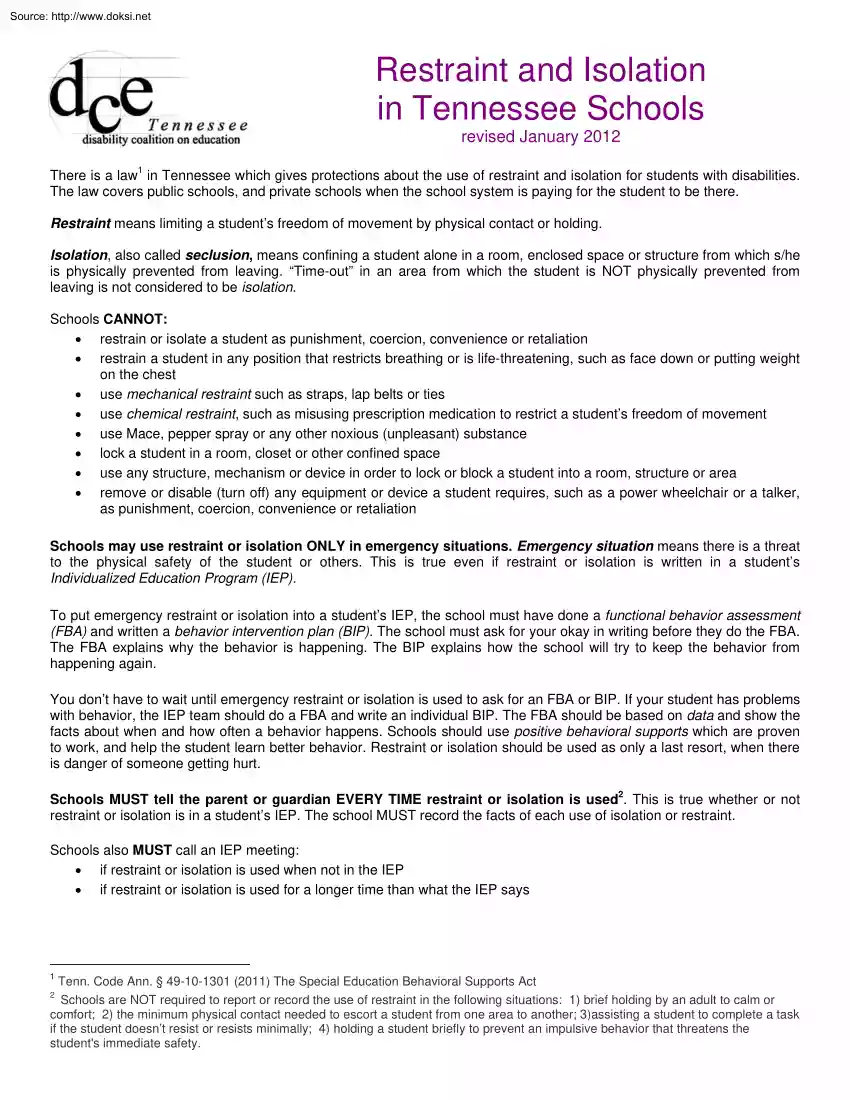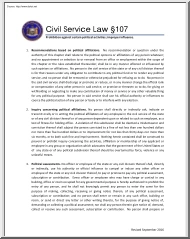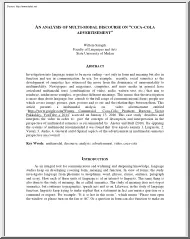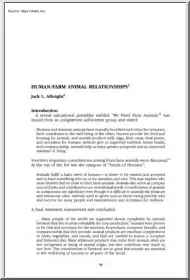A doksi online olvasásához kérlek jelentkezz be!

A doksi online olvasásához kérlek jelentkezz be!
Nincs még értékelés. Legyél Te az első!
Mit olvastak a többiek, ha ezzel végeztek?
Tartalmi kivonat
Source: http://www.doksinet Restraint and Isolation in Tennessee Schools revised January 2012 There is a law1 in Tennessee which gives protections about the use of restraint and isolation for students with disabilities. The law covers public schools, and private schools when the school system is paying for the student to be there. Restraint means limiting a student’s freedom of movement by physical contact or holding. Isolation, also called seclusion, means confining a student alone in a room, enclosed space or structure from which s/he is physically prevented from leaving. “Time-out” in an area from which the student is NOT physically prevented from leaving is not considered to be isolation. Schools CANNOT: • restrain or isolate a student as punishment, coercion, convenience or retaliation • restrain a student in any position that restricts breathing or is life-threatening, such as face down or putting weight on the chest • use mechanical restraint such as straps, lap
belts or ties • use chemical restraint, such as misusing prescription medication to restrict a student’s freedom of movement • use Mace, pepper spray or any other noxious (unpleasant) substance • lock a student in a room, closet or other confined space • use any structure, mechanism or device in order to lock or block a student into a room, structure or area • remove or disable (turn off) any equipment or device a student requires, such as a power wheelchair or a talker, as punishment, coercion, convenience or retaliation Schools may use restraint or isolation ONLY in emergency situations. Emergency situation means there is a threat to the physical safety of the student or others. This is true even if restraint or isolation is written in a student’s Individualized Education Program (IEP). To put emergency restraint or isolation into a student’s IEP, the school must have done a functional behavior assessment (FBA) and written a behavior intervention plan (BIP). The
school must ask for your okay in writing before they do the FBA The FBA explains why the behavior is happening. The BIP explains how the school will try to keep the behavior from happening again. You don’t have to wait until emergency restraint or isolation is used to ask for an FBA or BIP. If your student has problems with behavior, the IEP team should do a FBA and write an individual BIP. The FBA should be based on data and show the facts about when and how often a behavior happens. Schools should use positive behavioral supports which are proven to work, and help the student learn better behavior. Restraint or isolation should be used as only a last resort, when there is danger of someone getting hurt. Schools MUST tell the parent or guardian EVERY TIME restraint or isolation is used2. This is true whether or not restraint or isolation is in a student’s IEP. The school MUST record the facts of each use of isolation or restraint Schools also MUST call an IEP meeting: • if
restraint or isolation is used when not in the IEP • if restraint or isolation is used for a longer time than what the IEP says 1 Tenn. Code Ann § 49-10-1301 (2011) The Special Education Behavioral Supports Act Schools are NOT required to report or record the use of restraint in the following situations: 1) brief holding by an adult to calm or comfort; 2) the minimum physical contact needed to escort a student from one area to another; 3)assisting a student to complete a task if the student doesn’t resist or resists minimally; 4) holding a student briefly to prevent an impulsive behavior that threatens the student's immediate safety. 2 Source: http://www.doksinet Any space used as an isolation room, with or without a door, MUST be: • unlocked and incapable of being locked • free of anything that could hurt the student • well-ventilated, temperature controlled and adequately lit • where school staff can be in continuous direct visual contact with the student
(video cameras or monitors are not enough) • at least 40 square feet • in compliance with all health, fire and safety codes If members of the IEP team suggest writing restraint or isolation into your student’s IEP, you should: • ask for information about your and your student’s rights and protections under TN law • ask to see your school system’s policies on restraint and isolation • make sure the school does a functional behavior assessment (FBA) and a behavior intervention plan (BIP) • ask what training the school staff have had • ask to be shown the type of restraint that would be used • ask that restraint or isolation be used for the shortest time appropriate • ask in what specific situations restraint or isolation would be used. Restraint or isolation can be used only when there is a threat to someone’s physical safety. • ask to see the room used for isolation (sometimes called a “quiet” or “calming” room) • ask to bring the team back together
if your student is restrained or isolated frequently • ask that these points be put in writing in the behavior intervention plan, the Crisis Intervention/Safety Plan and the Prior Written Notice you should receive at the end of every IEP meeting If you disagree with writing restraint or isolation into the IEP, you can: • ask that the team meet again to consider your objections • ask to talk with someone in your local special education office • ask for the school to pay for an outside evaluation, called an independent educational evaluation (IEE), if you disagree with behavior testing done by the school • talk to an advocate • if these steps are not successful, you can file a request for a due process hearing. In Tennessee, if you refuse to sign or sign that you disagree with an IEP which the school system presents to you, the school can start using the IEP on the 15th day after you’ve refused. This is true UNLESS you file for due process to stop the IEP. If you believe
that your student has been harmed by the use of restraint or isolation: • if appropriate, make a report to Student Protective • seek medical attention immediately Services (toll-free 1-877-237-0004) • take photographs of any injuries • if appropriate, make a police report • notify the school • contact the Disability Law & Advocacy Center (information below) For information and/or advocacy assistance: Disability Law & Advocacy Center of TN Phone: 1-800-342-1660 TTY: 1-888-852-2852 Email: GetHelp@DLACTN.org Tennessee Disability Coalition’s Family Voices of Tennessee Toll free family line: 1-888-643-7811 Email: familyvoices@tndisability.org The Arc of Tennessee Phone: 615-248-5878 Toll Free: 1-800-835-7077 Email: info@thearctn.org STEP (Support and Training for Exceptional Parents) Phone: 1-800-280-STEP Espanol: 1-800-975-2919 TTY: 423-639-8802 Email: information@tnstep.org Tennessee Disability Pathfinder Phone: 1-800-640-4636 Web site:
tnpathfinder@vanderbilt.edu Tennessee Voices for Children Phone: 615-269-7751 Toll Free: 1-800-670-9882 Email: tvc@tnvoices.org * This Information Sheet was produced by the Disability Coalition on Education, DCE, a statewide alliance of families, agencies and advocacy organizations working together to improve educational outcomes for students with disabilities. If you want to learn more or to be added to DCE’s mailing list, send an e-mail to hlu1055@comcast.net
belts or ties • use chemical restraint, such as misusing prescription medication to restrict a student’s freedom of movement • use Mace, pepper spray or any other noxious (unpleasant) substance • lock a student in a room, closet or other confined space • use any structure, mechanism or device in order to lock or block a student into a room, structure or area • remove or disable (turn off) any equipment or device a student requires, such as a power wheelchair or a talker, as punishment, coercion, convenience or retaliation Schools may use restraint or isolation ONLY in emergency situations. Emergency situation means there is a threat to the physical safety of the student or others. This is true even if restraint or isolation is written in a student’s Individualized Education Program (IEP). To put emergency restraint or isolation into a student’s IEP, the school must have done a functional behavior assessment (FBA) and written a behavior intervention plan (BIP). The
school must ask for your okay in writing before they do the FBA The FBA explains why the behavior is happening. The BIP explains how the school will try to keep the behavior from happening again. You don’t have to wait until emergency restraint or isolation is used to ask for an FBA or BIP. If your student has problems with behavior, the IEP team should do a FBA and write an individual BIP. The FBA should be based on data and show the facts about when and how often a behavior happens. Schools should use positive behavioral supports which are proven to work, and help the student learn better behavior. Restraint or isolation should be used as only a last resort, when there is danger of someone getting hurt. Schools MUST tell the parent or guardian EVERY TIME restraint or isolation is used2. This is true whether or not restraint or isolation is in a student’s IEP. The school MUST record the facts of each use of isolation or restraint Schools also MUST call an IEP meeting: • if
restraint or isolation is used when not in the IEP • if restraint or isolation is used for a longer time than what the IEP says 1 Tenn. Code Ann § 49-10-1301 (2011) The Special Education Behavioral Supports Act Schools are NOT required to report or record the use of restraint in the following situations: 1) brief holding by an adult to calm or comfort; 2) the minimum physical contact needed to escort a student from one area to another; 3)assisting a student to complete a task if the student doesn’t resist or resists minimally; 4) holding a student briefly to prevent an impulsive behavior that threatens the student's immediate safety. 2 Source: http://www.doksinet Any space used as an isolation room, with or without a door, MUST be: • unlocked and incapable of being locked • free of anything that could hurt the student • well-ventilated, temperature controlled and adequately lit • where school staff can be in continuous direct visual contact with the student
(video cameras or monitors are not enough) • at least 40 square feet • in compliance with all health, fire and safety codes If members of the IEP team suggest writing restraint or isolation into your student’s IEP, you should: • ask for information about your and your student’s rights and protections under TN law • ask to see your school system’s policies on restraint and isolation • make sure the school does a functional behavior assessment (FBA) and a behavior intervention plan (BIP) • ask what training the school staff have had • ask to be shown the type of restraint that would be used • ask that restraint or isolation be used for the shortest time appropriate • ask in what specific situations restraint or isolation would be used. Restraint or isolation can be used only when there is a threat to someone’s physical safety. • ask to see the room used for isolation (sometimes called a “quiet” or “calming” room) • ask to bring the team back together
if your student is restrained or isolated frequently • ask that these points be put in writing in the behavior intervention plan, the Crisis Intervention/Safety Plan and the Prior Written Notice you should receive at the end of every IEP meeting If you disagree with writing restraint or isolation into the IEP, you can: • ask that the team meet again to consider your objections • ask to talk with someone in your local special education office • ask for the school to pay for an outside evaluation, called an independent educational evaluation (IEE), if you disagree with behavior testing done by the school • talk to an advocate • if these steps are not successful, you can file a request for a due process hearing. In Tennessee, if you refuse to sign or sign that you disagree with an IEP which the school system presents to you, the school can start using the IEP on the 15th day after you’ve refused. This is true UNLESS you file for due process to stop the IEP. If you believe
that your student has been harmed by the use of restraint or isolation: • if appropriate, make a report to Student Protective • seek medical attention immediately Services (toll-free 1-877-237-0004) • take photographs of any injuries • if appropriate, make a police report • notify the school • contact the Disability Law & Advocacy Center (information below) For information and/or advocacy assistance: Disability Law & Advocacy Center of TN Phone: 1-800-342-1660 TTY: 1-888-852-2852 Email: GetHelp@DLACTN.org Tennessee Disability Coalition’s Family Voices of Tennessee Toll free family line: 1-888-643-7811 Email: familyvoices@tndisability.org The Arc of Tennessee Phone: 615-248-5878 Toll Free: 1-800-835-7077 Email: info@thearctn.org STEP (Support and Training for Exceptional Parents) Phone: 1-800-280-STEP Espanol: 1-800-975-2919 TTY: 423-639-8802 Email: information@tnstep.org Tennessee Disability Pathfinder Phone: 1-800-640-4636 Web site:
tnpathfinder@vanderbilt.edu Tennessee Voices for Children Phone: 615-269-7751 Toll Free: 1-800-670-9882 Email: tvc@tnvoices.org * This Information Sheet was produced by the Disability Coalition on Education, DCE, a statewide alliance of families, agencies and advocacy organizations working together to improve educational outcomes for students with disabilities. If you want to learn more or to be added to DCE’s mailing list, send an e-mail to hlu1055@comcast.net




 Ahogy közeledik a történelem érettségi, sokan döbbennek rá, hogy nem készültek fel eléggé az esszéírás feladatra. Módszertani útmutatónkban kitérünk a történet térbeli és időbeli elhelyezésére, a források elemzésére és az eseményeket alakító tényezőkre is.
Ahogy közeledik a történelem érettségi, sokan döbbennek rá, hogy nem készültek fel eléggé az esszéírás feladatra. Módszertani útmutatónkban kitérünk a történet térbeli és időbeli elhelyezésére, a források elemzésére és az eseményeket alakító tényezőkre is.